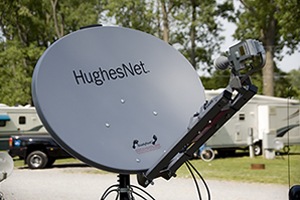
It may be helpful for you to know what happens when you order HughesNet service, and how your internet equipment will be installed.
When you call us to order HughesNet service, a friendly customer service agent will ask you how many people in your household will be connected at once, what you use the internet for, what your budget is, and what kind of internet service you’ve had in the past. The purpose of these questions is to find the HughesNet service tier and equipment that will best meet your needs. The CSA will explain all charges, what to expect at installation, and any promotions that may be in effect.
When you’ve agreed to schedule installation, the CSA will find the date and time window that work best for you. The window will usually be two or three hours, in case a previous installation takes longer than expected.
The technician will bring with him a satellite dish, a modem, and any cable needed for your HughesNet system.
After greeting you, the technician will conduct a site survey. The internet signal comes from a satellite 22,000 miles up in the stratosphere, and the technician has to make sure your dish has clear line of sight to it. He will need to point the dish to the southern sky. He will mount the dish on the house or on a fence post or pole, unless trees, buildings or other obstructions are in the way. If he can’t get clear line of sight from your house or an existing pole or post, he may recommend a pole mount. This requires extra work and material, so if a pole mount is necessary, he may charge extra for it. Pole mounts are not necessary for more than about 5% of HughesNet installations, though.
After the site survey, the technician will mount the dish, using his own mounting hardware. He will check line of sight again, and adjust the dish level and angle for the. strongest possible signal. Then he will run a coaxial cable into your house.
The technician will connect the cable to your modem, and will connect the modem to his mobile electronic device. He will bring up a screen which tells him your strong your satellite signal is. If it’s not as strong as it should be, he will adjust the dish again. Once he has confirmed that your signal is strong enough, he will give you a code to activate your service, and ask you to boot up your computer so you can verify that your connection is working.
The technician will then present your paperwork, collect any fees due at installation, clean up the work site, and explain how to contact customer service with any questions or concerns.
Your HughesNet installation is then complete, and you are ready to begin surfing the web.





